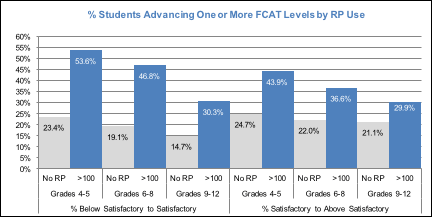
Purpose of Study:
This study evaluated the effect of Reading Plus practice on the results achieved by lower- and higher-performing General Education students on the reading portion of the Florida Comprehensive Assessment Test 2.0 (FCAT). The FCAT is the standardized state test that was administered to Florida public school students in Grades 3 through 10 in 2014 and prior years.
Study Design:
Included in the study were general education students (i.e., not receiving services for ELL or SPED) in grades 4-10 with valid 2013 and 2014 FCAT data (n = 104,475). Of these, 74% were eligible for free or reduced-price lunch and 61% completed reading practice lessons.
This study evaluated the changes in performance levels between the spring 2013 and spring 2014 administrations of the FCAT in relation to starting level on the FCAT and the amount of reading practice students engaged in. Reading practice was quantified in terms of the number of reading practice lessons completed.
Key Results:
Of the elementary, middle, and high school students who scored below satisfactory (below FCAT level 3) in reading in 2013, a significantly larger percentage of students who engaged in Reading Plus practice achieved satisfactory levels (FCAT level 3) or higher in 2014 as compared to students who did not engage in Reading Plus practice.
Students who had already achieved FCAT Level 3 (satisfactory) or higher at the end of the 2013 school year, and then completed at least 100 Reading Plus lessons (~30 hours), were significantly more likely to advance to Level 4 (above satisfactory) or Level 5 (mastery of most challenging content) on the FCAT at the end of the 2014 school year.

